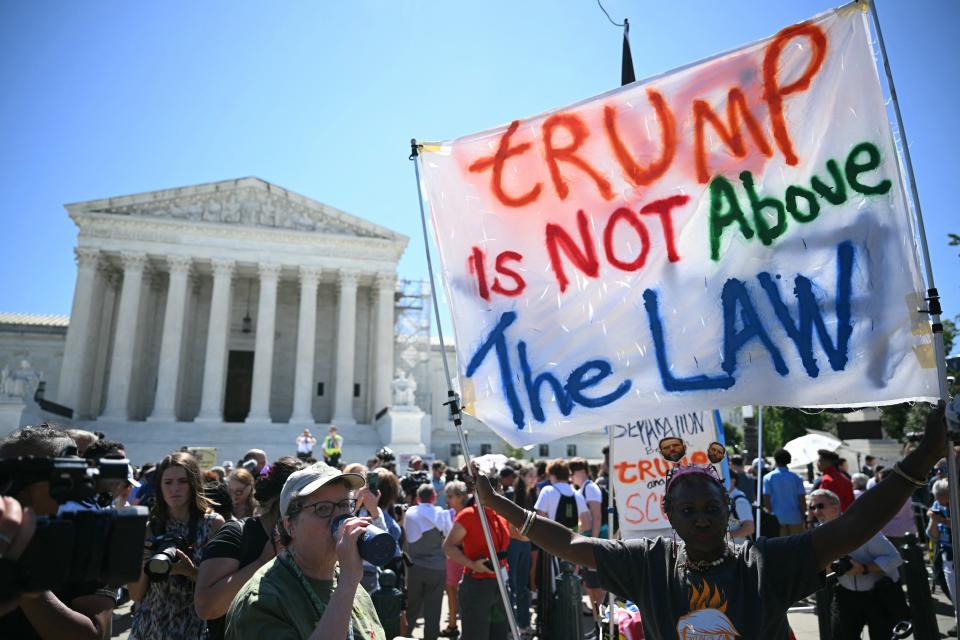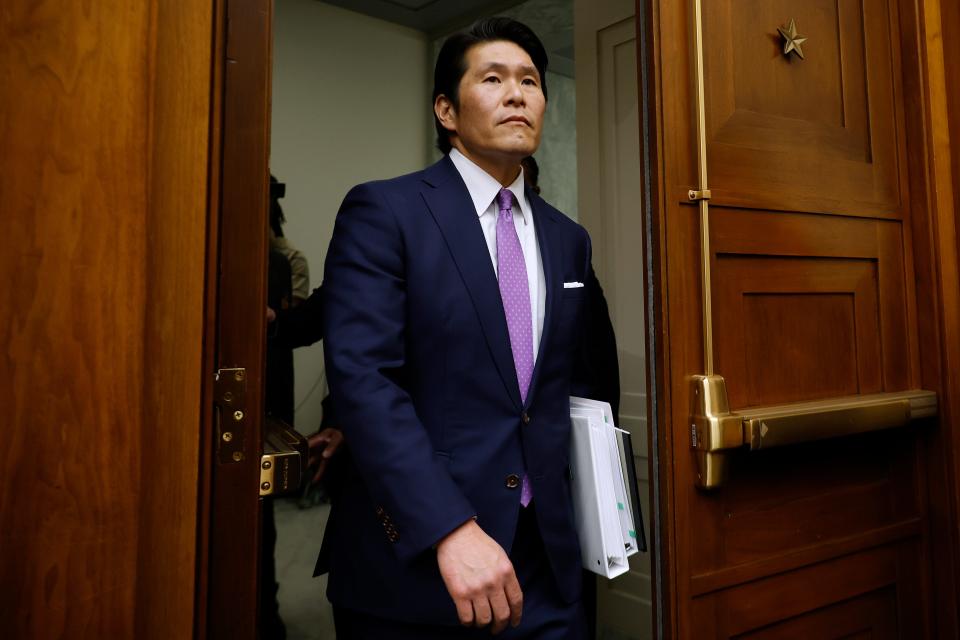'Democracy turns into a dictatorship': Experts warn about SCOTUS presidential immunity ruling
The Supreme Court's much-anticipated presidential immunity ruling didn't just chop out sections of the federal election interference indictment against former President Donald Trump. Legal experts say it also breathed life into what many previously viewed as outlandish legal theories of immunity for assassinating a rival and other autocratic behavior.
"It's a potentially very, very dangerous opinion with respect to things that Donald Trump never did. He could have sent the military in on January 6 to support the insurrection," Richard Painter, a former White House ethics lawyer for President George W. Bush, told USA TODAY. "In many countries, that's how a democracy turns into a dictatorship," Painter said.
The court's conservative majority held on July 1 that presidents are completely immune from prosecution for things they did through core constitutional powers of the presidency. They specified those core powers include presidential pardons and communications with the Attorney General, but didn't list everything that's included.
The court's Republican appointees also said presidents are at least presumed to be immune – and potentially are always immune – for all official acts of their presidency. Presidents can still be prosecuted for their unofficial criminal behavior.

The opinion is open to interpretation, including on what constitutes a core power and an official act. That's dangerous ammunition for politically-appointed lawyers who are sometimes inclined to write memos giving presidents legal cover to push boundaries, according to Painter.
"Those lawyers are going to take this opinion and they're going to run with it," Painter said.
Stephen Vladeck, a professor at the Georgetown University Law Center, said on the Just Security Podcast that Chief Justice John Roberts, who wrote the majority opinion, could have responded to assertions by dissenting Justice Sonia Sotomayor about what specific conduct was immunized and what wasn't – and yet he chose not to.
"The problem is that smart lawyers, and even not-so-smart lawyers, can pick apart this opinion to serve whatever purposes they want it to serve," Vladeck said.
Assassinating a political rival
The Supreme Court's majority opinion didn't address whether a president would be immune from prosecution for assassinating a political rival while in office.
Many saw that omission as conspicuous given Sotomayor's dissenting opinion – which was joined by her fellow Democratic-appointed justices, Elena Kagan and Ketanji Brown Jackson – accused the majority of providing cover for just that.
"Orders the Navy’s Seal Team 6 to assassinate a political rival? Immune," Sotomayor wrote.
Instead of denying Sotomayor's claim, Roberts shot back that the dissent engaged in "fear mongering on the basis of extreme hypotheticals" while overlooking the risk that presidents can't "boldly and fearlessly" carry out their duties for fear of prosecution.
Leah Litman, a University of Michigan law professor who clerked for former Supreme Court Justice Anthony Kennedy, pointed on the Strict Scrutiny legal podcast to the portion of the majority's opinion stating that Trump is absolutely immune from prosecution for his alleged conduct involving discussions with Justice Department officials, including requesting sham election fraud investigations to convince states to replace legitimate presidential electors.
"On the same logic, a court could say the president's orders to a military are absolutely immune even though the president is doing this for personal gain, political vengeance, or whatever," Litman said. The opinion "is at a minimum unclear about this."
Some experts expressed skepticism about whether the court would actually allow such an act or whether the question matters.
Andy Grewal, a University of Iowa law professor who has written a paper on presidential immunity, told USA TODAY he doesn't believe killing a political rival would be an official act subject to the Supreme Court's protections, noting the Supreme Court has never said the Constitution's commander-in-chief clause means presidents can kill whomever they want.
"My bigger point is that question doesn't even matter," Grewal added. "If the president can kill his political rivals without consequence, who's going to prosecute him? Then he can just kill the prosecutor. The judge says it's illegal? Then he just kills the judge."
William Baude, a University of Chicago law professor and former law clerk to Roberts, said on the legal podcast Divided Argument that a president's use of force domestically might not be regarded as a core power that is absolutely immune, even if actions abroad during wartime are. In that sense, he said it's unclear if a president would be shielded after ordering a Seal Team 6 hit on a political rival.
"Presumably it would be an official act, so it would be presumptively immune, but then maybe you can rebut the presumptive immunity," Baude said.
Exchanging presidential favors for bribes
Sotomayor also argued that the conservative wing of the court had immunized presidents from prosecution for exchanging pardons for bribes.
Roberts didn't deny that assertion, although he did discuss a potential bribery prosecution against a president. Yet even there, Roberts curtailed the evidence prosecutors could present to try to prove the president exchanged an official act for a bribe.
Roberts said a jury can't consider evidence about actions subject to presidential immunity even for the limited purpose of proving the president committed a crime through unofficial conduct.
Justice Amy Coney Barrett refused to sign onto that portion of the majority opinion, even as she signed onto the rest, writing separately that excluding any mention of the official act exchanged for a bribe "would hamstring the prosecution." Roberts responded that prosecutors may point to a public record showing the president performed the official act, but can't seek witness testimony or private records probing the official act.
"They don't want you to say, 'Look, this act was obviously a bad thing to do, and all the presidents advisors said it was a bad thing to do, and therefore that supports an inference that the president must have been bribed,'" Baude said of that portion of the opinion.
Election interference and political prosecutions
Trump has repeatedly threatened to use the Justice Department to prosecute his rivals. In 2016, he campaigned against Hillary Clinton using calls to "lock her up," even though FBI Director James Comey, a Republican, declined to recommend charges for her use of a private email server as secretary of state.
Likewise, former Trump advisor Steve Bannon recently said a future Trump White House will "hunt down" Comey and his successor, Andrew McCabe, after they investigated Trump's alleged collusion with Russia in the 2016 campaign.
In one sense, the court's ruling appears to restrain presidents who want to prosecute or harass rivals, since they can't prosecute a predecessor for protected official acts.
But when it comes to a potential second Trump term in particular, Trump could revisit the Justice Department's decision not to prosecute President Joe Biden for allegedly mishandling classified documents. The allegations against Biden are tied to the time period after his vice presidency, so they don't appear to implicate presidential immunity arguments.

The conservative case for the deep state
Another potential restraint on the president comes indirectly: While the immunity ruling may shield the president, it doesn't necessarily shield subordinates. For instance, the ruling doesn't appear to provide protection for someone like Jeffrey Clark, a Trump Justice Department official who has been indicted in Georgia on election interference charges. That gives executive branch employees an incentive not to follow illegal presidential instructions.
"The president is immune, right, but I don't think the underlings are," said Barbara McQuade, a former U.S. Attorney who teaches at the University of Michigan's law school, on the legal podcast #SistersInLaw.
However, under the ruling, the president could pardon the underlings for, say, assassinating a rival, "so that's how they get away with this abuse of power," McQuade said.
Presidential pardons, however, only apply to federal crimes, so someone pardoned could still be charged for state crimes. By contrast, due to the Supreme Court's ruling, former presidents themselves can no longer be charged by state or federal prosecutors for protected official conduct.
Grewal suggested that, apart from the legal immunity questions surrounding such hypotheticals, the Washington bureaucracy could be a bulwark against a president attempting to commandeer a large office.
"I would be shocked if there was a whole bunch of criminal investigations against Biden and Co. once Trump became president ... just because the internal resistance would be so strong," Grewal said.
Justice Samuel Alito made a similar point at Supreme Court oral arguments when it came to political assassinations.
“I don’t want to slander SEAL Team 6,” Alito said. "They're honorable officers, and they are bound by the Uniform Code of Military Justice not to obey unlawful orders."
The Heritage Foundation, a conservative think tank based in Washington, D.C., has created an approximately 900-page plan titled "Project 2025" to abolish multiple government agencies and replace tens of thousands of workers with loyalists under the next conservative president.
Trump has tried to distance himself from the project, posting on Truth Social on July 5 that some of the proposals are "absolutely ridiculous and abysmal" and, while he wishes the project's backers luck, he has "nothing to do with them."
However, several Trump allies are associated with the project, including Trump advisor Stephen Miller. The project's director, Paul Dans, was chief of staff for the Trump administration's Office of Personnel Management.
The immunity ruling may also provide Trump with added protection if he orders his attorney general to quash the two federal prosecutions he faces, one alleging federal election interference and one alleging he mishandled classified documents. Before the ruling, Trump may have been vulnerable to obstruction of justice charges for going down that path, but the Supreme Court said presidents have absolute immunity for both their communications with the attorney general and removing an attorney general from office.
This article originally appeared on USA TODAY: Seal Team 6 killing? Trump may be immune for that and more
